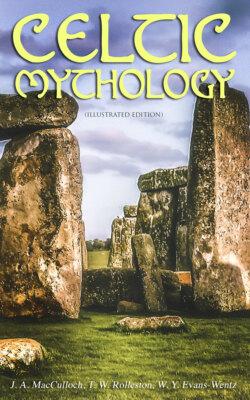Читать книгу CELTIC MYTHOLOGY (Illustrated Edition) - T. W. Rolleston - Страница 85
На сайте Литреса книга снята с продажи.
PRAYER.
ОглавлениеPrayer accompanied most rites, and probably consisted of traditional formulæ, on the exact recital of which depended their value. The Druids invoked a god during the mistletoe rite, and at a Galatian sacrifice, offered to bring birds to destroy grasshoppers, prayer was made to the birds themselves.798 In Mona, at the Roman invasion, the Druids raised their arms and uttered prayers for deliverance, at the same time cursing the invaders, and Boudicca invoked the protection of the goddess Andrasta in a similar manner.799 Chants were sung by the "priestesses" of Sena to raise storms, and they were also sung by warriors both before and after a battle, to the accompaniment of a measured dance and the clashing of arms.800 These warrior chants were composed by bards, and probably included invocations of the war-gods and the recital of famous deeds. They may also have been of the nature of spells ensuring the help of the gods, like the war-cries uttered by a whole army to the sound of trumpets.801 These consisted of the name of a god, of a tribe or clan, or of some well-known phrase. As the recital of a divine name is often supposed to force the god to help, these cries had thus a magical aspect, while they also struck terror into the foe.802 Warriors also advanced dancing to the fray, and they are depicted on coins dancing on horseback or before a sword, which was worshipped by the Celts.803 The Celtiberian festival at the full moon consisted entirely of dancing. The dance is a primitive method of expressing religious emotion, and where it imitates certain actions, it is intended by magical influence to crown the actions themselves with success. It is thus a kind of acted prayer with magical results.
